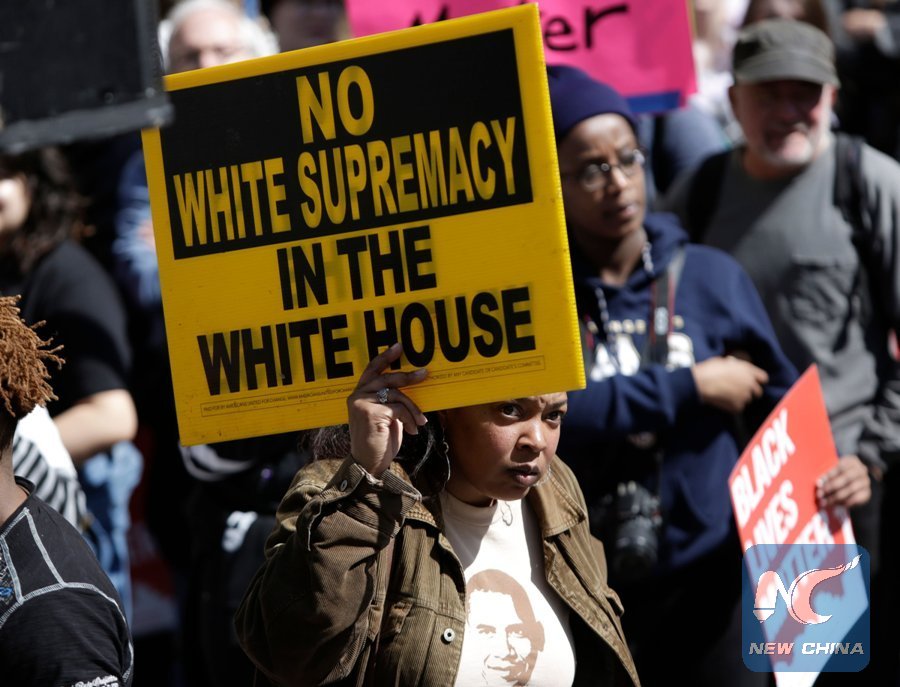
File photo taken on April 15, 2017 shows people as they carry signs and march at a Black Lives Matter protest in Seattle, Washington. (Xinhua/AFP)
by Xinhua writer Yang Shilong
NEW YORK, Jan. 16 (Xinhua) -- Nearly 50 years after Martin Luther King (MLK) Jr.'s assassination, the famed civil rights activist's dream has yet to be realized. Racism remains a serious problem in a still divided America.
"I have a dream that my four little children will one day live in a nation where they will not be judged by the color of their skin, but by the content of their character," said MLK in his iconic "I Have A Dream" speech on the steps of the Lincoln Memorial, Washington D.C. on Aug. 28, 1963.
If MLK were still alive today, "he would be disappointed by our large homeless populations, our failing schools and struggling healthcare system," said Tchanori Kone, a fifth-grade girl from Houston, Texas, in her speech, which won first place last weekend at the Annual Gardere MLK Jr. Oratory Competition.
Few Americans would disagree with Kone. Although racism and race-based discrimination are considered evil by the majority of Americans, racism is still a serious problem in the United States today. Often it can be more subtle or even built into the system, as seen by racial profiling by law enforcement officers and other government officials, as some experts pointed out.
Radical U.S. fringe groups came into the spotlight last August in Charlottesville, Virginia, after a violent white nationalist rally resulted in the death of a 32-year-old woman, who was killed by a white supremacist when he plowed a car into a crowd of counter protesters.
The number of hate crimes in 2016 stood at 6,121, almost a five percent rise from 2015, according to statistics released by the Federal Bureau of Investigation. About half of those incidents were motivated by race.
The Southern Poverty Law Center, which keeps tabs on hate groups, documented 917 active hate groups in the United States in 2016. The number was 892 in 2015.
Also on the decline, is America's economic inequality. In 1980, the top one percent of adult Americans earned an average 27 times more than the bottom 50 percent. Today, they earn 81 times more.
As of 2016, the latest year of data publication, the average hourly wage for black workers is 14.92 U.S. dollars, 25 percent less than that of white workers, according to an analysis of the current status of economic equality between black and white Americans published recently by the Economic Policy Institute.
However, the wealth gap significantly widens when measured by median household income and is even worse by median family net worth, the report said. Median income for black households is 40 percent lower than that for white households. Median household net worth is just one-tenth of their white counterparts.
According to a 2012 UNICEF study on childhood poverty, the United States ranked 34th out of 35 countries with a childhood poverty rate of 23.1 percent. Other studies place the number a little lower, at about 20 percent, but both numbers are much higher than in other advanced countries. For black and Hispanic American children, the poverty rate is even higher, at 36 percent and 31 percent respectively.
"I may not get there with you. But I want you to know tonight, that we, as a people, will get to the Promised Land," said MLK at his final address in Memphis, Tennessee, on April 3, 1968. Fifty years later, America still has a long way to go to the Promised Land.

